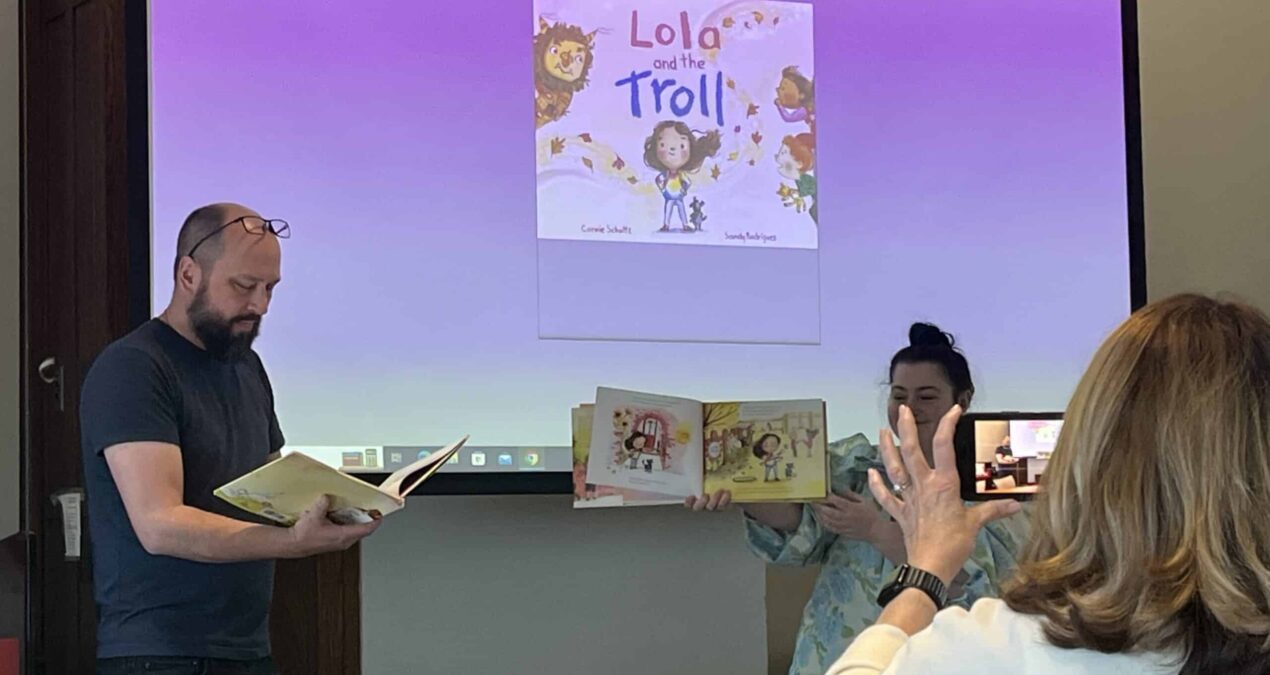MIA FISCHEL, Features Editor–
On the release day of her new book, professor Connie Schultz walked into the Barney Davis boardroom expecting a meeting. Instead, a group of students and faculty greeted her with applause, waiting in anticipation for a surprise reading of the pre-ordered book.
Schultz is known for her Pulitzer-winning columns and writing which lends voices to the underprivileged and unheard. This marks her publication of yet another hard-hitting piece: Lola and the Troll, a picture book.
In collaboration with illustrator Sandy Rodriguez, Schultz tells the story of Lola, a little girl with a big heart. Followed by her faithful dog Tank, Lola fearlessly confronts the world around her until a bully masquerading as a troll appears and degrades her appearance.
“It’s all about her hair, her eyes, her height,” Schultz said. “It has nothing to do with the big ideas in her mind, the capabilities that she has, her creativity; it’s just meant to diminish her.”
Inspired by her six-year-old granddaughter Ela, Lola is a Latina with curly hair and hazel brown eyes. Schultz chose to create a strong female protagonist, a character that was lacking in children’s books when she raised her own daughter.
Due to Tom the Troll’s comments, Lola begins to feel self-conscious. She ties her hair up, speaks in a whisper and stops smiling. Even people like Lola, a strong and passionate young girl, need an equally strong support system. Eventually, a librarian named Ms. Sneesby notices that something amiss and encourages Lola to be herself.
As the story culminates, Lola regains confidence and stands up to the “troll,” who is revealed to just be a lonely, attention-deprived boy. Plus, he’s shorter than Lola.
“I didn’t want anybody to be demonized. I wanted the message to be that there are much better ways to engage with one another, and I do think being kind is a superpower at any age,” Schultz said.
In transferring this message to a picture book, Schultz was given 1000 words– rather than the usual 700 word column– to tell a powerful story about bullying. On the day of release, she had already received positive feedback from teachers and mothers, hopeful with the rise in coverage on the topic.
This theme of empowerment runs true through her other work, which speaks up for the oppressed and remains critical of those who abuse power. As such, she is well-versed in dealing with social media hate and anonymous trolls on the internet. This picture book isn’t solely for children; Schultz hopes to also encourage young women to trust themselves and ignore hateful comments in this age of cyber bullying.
“I hear from so many young women who want to know how to deal with the trolls. We can all say that we shouldn’t let it bother us, but the pile-on can really accumulate,” Schultz said. “You will have people in your life who want to make you feel bad about yourself, but we shouldn’t give them permission to let us feel that way.”
At the end of the book reading, the boardroom again filled with applause and congratulations.
“This is why I wrote the book… for kids like you,” Schultz said.

